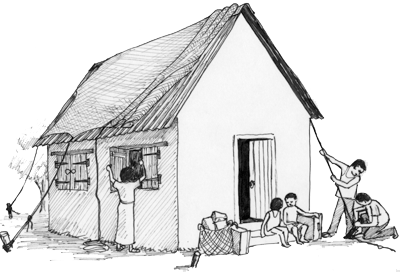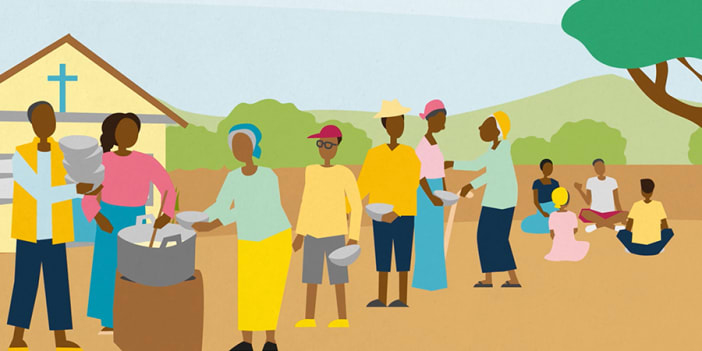- There is usually some warning of approaching cyclones. However, their speed, strength and direction often change. Residents in cyclone-prone areas should always be prepared.
- Preparations should include routinely removing all large overhanging branches from buildings and roads. Roofs should be well maintained and strengthened with more timbers to hold down roofing sheets. Corrugated iron sheets should be avoided as roofing materials in these areas as they are so dangerous if they break loose. All loose tiles should be replaced immediately. Drains should be kept clear to enable them to cope with very heavy rains. Window shutters can be a very helpful protection against damage.
- Immediately before a cyclone, rope down roofs to prevent damage. Fishing nets can also be used to secure possessions or roofs.
- Maintain supplies in emergency shelters and prepare an evacuation plan for people who need help to reach the shelters.

Tools and guides
Coping with cyclones
How to prepare for and protect against cyclones, with discussion questions for groups
2005 Available in English, French, Spanish and Portuguese

- Discuss how warnings may arrive. Are they more likely to come by radio, TV or by visits from local government staff ?
- How good are the emergency warning procedures in your area? Will people receive as much warning as possible to help save lives and property?
- Are there building experts who could give a talk on how to help people strengthen their homes against cyclone damage? What are the difficulties people will have in strengthening their homes?
- Are you aware of any agencies that might help with advice and funding to strengthen roofs and buildings?
- What could the church do to help the community prepare for a cyclone?
Similarly Tagged Content
Share this resource
If you found this resource useful, please share it with others so they can benefit too.

Get our email updates
Be the first to hear about our latest learning and resources
Sign up now - Get our email updates






